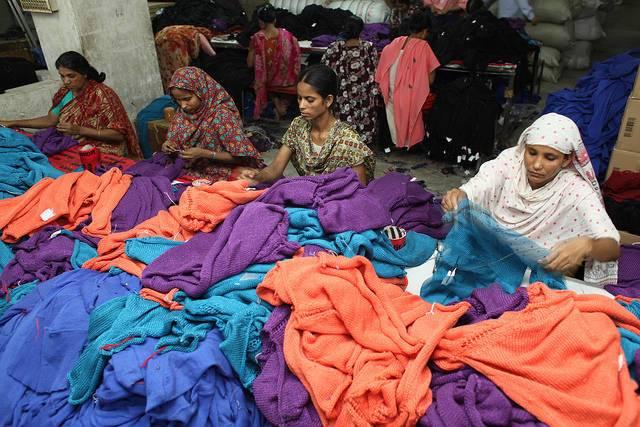
On Wednesday during International Women’s Day, H&M made headlines in some fashion blogs for the release of its new unisex denim clothing line.
But another H&M announcement made on Wednesday could make a far bigger difference: The fast-fashion giant will join the United Nation’s Better Than Cash Alliance. The organization, which so far counts 50 members including the Gates Foundation, MasterCard and Coca-Cola, aims to eliminate cash payouts for supply chain workers in favor of digital payments in order to boost financial inclusion and curb poverty.
The Alliance says far too many factories and countless other job sites around the world pay their employees in cash. Such a system is inefficient, lacks transparency and also puts workers’ safety at risk – after all, it is not too difficult for someone to figure out when payday is at the local neighborhood factory or workshop.
Conversely, switching to a digital payment system can reduce a factory’s costs, save time and also improve workers’ access to financial services. A program Standard Bank launched a few years ago in South Africa, for example, opened new job opportunities while allowing consumers to quickly and cheaply wire money relatives or buy funds with a cell phone or bank card.
An Alliance case study focused on the apparel industry in Bangladesh and suggests how switching to a digital payroll system can benefit both employers and employees.
In one textile factory, each worker spent about 18 minutes a month queueing in line to receive his or her wages in cash. That may at first seem like a negligible amount of time, until one realizes the result is 750 lost hours of factory production – an amount of labor that can make a huge difference in an industry where profit margins are thin. For workers, the vast majority of whom are women, digital payments offered less risk of theft and more control over their personal finances.
There is plenty of room for improvement across Bangladesh’s garment industry: The Alliance’s research estimated that of the $40.4 billion made in wage payments last year, 90 percent of those funds were dispersed in cash.
Some analysts suggest the benefits that digital payments give poorer citizens are overstated, and assert that banking fees and the growth of “big data” can actually marginalize the poor even further. But proponents of expanding digital finance point to the growth of bank deposit holders in Kenya, which surged from 4.7 million people in 2007 to over 35 million by the end of 2015. The result is that more citizens, including those in remote villages where the closest bank branch or ATM could be hours away, now have safe access to banks and, more importantly, their money. In turn they can then easily deposit, store and spend money, while also being prepared for a medical emergency or a similar crisis.
H&M was not specific about its level of involvement with the Alliance, nor has the company shared how it will work with its supply chain to expand employees’ access to financial services. There are many challenges, as in sorting out how to pay employees, whether by mobile telephony, bank cards or a hybrid system.
Nevertheless, the company’s move could nudge other large fashion companies to follow suit. After all, H&M claims that 1.6 million people work within its global supply chain. And if digital payments could be expanded to cotton farmers and the producers of other raw materials that are included in the company’s clothing, the reach could extend to as many as 250 million people.
Image credit: Asian Development Bank/Flickr

Leon Kaye has written for 3p since 2010 and become executive editor in 2018. His previous work includes writing for the Guardian as well as other online and print publications. In addition, he's worked in sales executive roles within technology and financial research companies, as well as for a public relations firm, for which he consulted with one of the globe’s leading sustainability initiatives. Currently living in Central California, he’s traveled to 70-plus countries and has lived and worked in South Korea, the United Arab Emirates and Uruguay.
Leon’s an alum of Fresno State, the University of Maryland, Baltimore County and the University of Southern California's Marshall Business School. He enjoys traveling abroad as well as exploring California’s Central Coast and the Sierra Nevadas.














